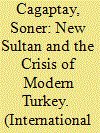| Srl | Item |
| 1 |
ID:
163641


|
|
|
|
|
| Summary/Abstract |
Turkey’s deep societal polarisation is a direct result of Recep Tayyip Erdogan’s political trajectory. Prime minister of Turkey since 2003 and president since 2014, Erdogan has become the most unassailable Turkish leader since Mustafa Kemal Ataturk established modern Turkey in 1923 out of the ashes of the Ottoman Empire. A prototype of populist leaders globally, Erdogan has demonised and brutalised demographics that are not likely to vote for him, including leftists and liberals. Erdogan’s populism has helped him built a loyal base composed mostly of conservatives, many of whom he has lifted out of poverty. Accordingly, Turkey is split nearly in the middle: half the country adores him, while the other half loathes him. But, Erdogan wants to shape all of Turkey, including those that loathe him, in his own image, using his power to funnel state resources towards top-down social engineering. To this end, he has decided to push ahead, declaring himself omnipotent president. Half of Turkey though will never embrace Erdogan’s agenda and this will exacerbate Turkey’s deep political crisis.
|
|
|
|
|
|
|
|
|
|
|
|
|
|
|
|
| 2 |
ID:
153764


|
|
|
|
|
| Summary/Abstract |
The article compares analytically populism and technocracy as alternative forms of political representation to party government. It argues that populist and technocratic principles of representation challenge fundamental features of party democracy. The two alternative forms of representation are addressed theoretically from the perspective of political representation. First, the article identifies the commonalities between the two forms of representation: both populism and technocracy are based on a unitary, nonpluralist, unmediated, and unaccountable vision of society's general interest. Second, it highlights their differences. Technocracy stresses responsibility and requires voters to entrust authority to experts who identify the general interest from rational speculation. Populism stresses responsiveness and requires voters to delegate authority to leaders who equate the general interest with a putative will of the people. While the populist form of representation has received considerable attention, the technocratic one has been neglected. The article presents a more complete picture of the analytical relationship between them.
|
|
|
|
|
|
|
|
|
|
|
|
|
|
|
|